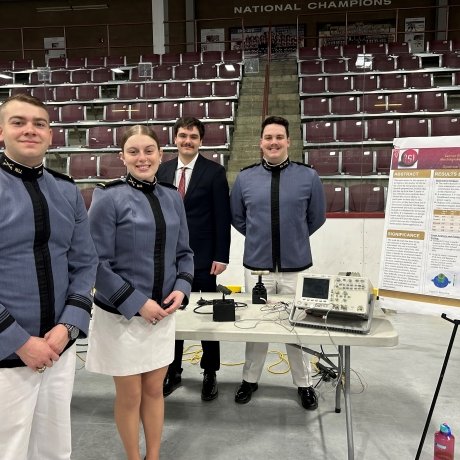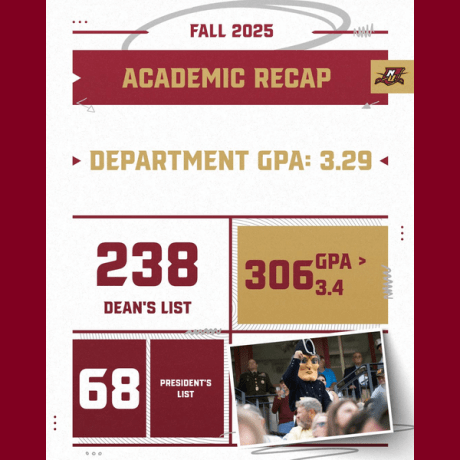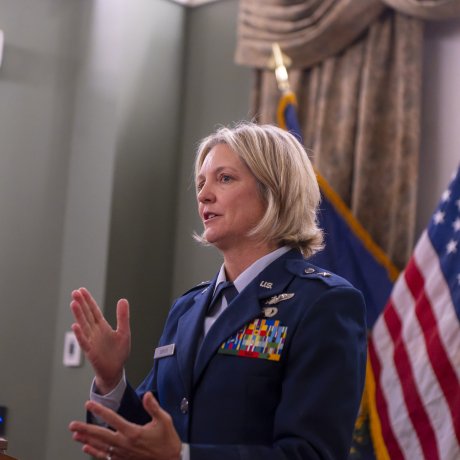Four senior engineering students design and build an enhanced prototype joystick for client with cerebral palsy.
During the 2023-24 academic year, four senior Norwich University engineering students combined their skills to build a prototype joystick for a client with cerebral palsy. Mechanical Engineering majors Tanner Buckelew, Helena Robinson, and Sebastian Mowbray teamed up with Interdisciplinary Engineering major Andrew Wade for this successful project.

The team identified a pair of significant flaws in the client’s existing joystick – it only offered four directions and typically was unusable after only a single year of use. Driven to produce a more robust and convenient solution, the students embarked on a careful and comprehensive review of other available current joysticks. The insights gleaned allowed the team to develop an advanced, more sustainable joystick with both improved mechanical and electrical designs.
Mechanically, the quartet made a stem of three pieces, a T-handles, a stainless-steel rod, and a 3-D printed gimbal. Electrically, instead of the commonly standard four microswitches which clicked every time they were activated, the students opted for Hall sensors which convert a magnetic signal to an electrical signal. The improvement allowed the joystick 360-degree proportionality. During the project, the team also collaborated with Adaptive Switch Laboratories, Inc. (ASL, Inc.) from Spicewood, Texas, to create a new circuit board based on the students’ new design with Hall sensors.
In April 2024, a successful trial was conducted on the innovative joystick prototype by the students on the client’s wheelchair. Once additional testing by a technician from National Seating and Mobility are completed, the client plans to integrate this newly developed prototype joystick with their wheelchair. This collaboration has created a considerable direct enhancement of the client’s quality of life by augmenting their mobility. Despite the previous use of Hall sensors in joysticks, the client was previously unable to utilize a joystick employing this technology with their existing wheelchair. These challenges were overcome by the students as they successfully presented a new tactile proof-of-concept joystick incorporating the improved technology.
The final phase of the projected aimed to enhance the lifespan of the product. The preceding joystick model, with a limited use-life of approximately one year, was deemed unsatisfactory. The innovative student design has amplified the product’s lifespan by over five times. The reliability calculations conducted by the students show the new model has a robust lifespan of 5.2 years.
Over the course of the project, two distinguished Norwich University professors collaborated closely with the students. Professor Emeritus Michael Prairie assisted with the electrical design while their advisor Professor Illari Vihinen assisted on the mechanical design.
* * *
About Norwich University
Norwich University is a diversified academic institution that educates traditional-age students and adults in a Corps of Cadets and as civilians. Norwich offers a broad selection of traditional and distance-learning programs culminating in baccalaureate and graduate degrees. Norwich University was founded in 1819 by Captain Alden Partridge of the U.S. Army and is the oldest private military college in the United States of America. Norwich is one of our nation's six senior military colleges and the birthplace of the Reserve Officers’ Training Corps (ROTC). www.norwich.edu
Read More

Celebrating Academic Excellence
By Norwich Athletic Communications
Norwich athletics celebrates the student-athletes who have earned recognition in the classroom.
2 min read

Former Marine general who was Trump chief of staff to speak at Norwich
By Beth McDermott
Link takes reader to an external article.

Lessons in Leadership
By Zack Bennett
A general officer visits the Women Kicking Glass Student Club to share her insights on success.
6 min read
